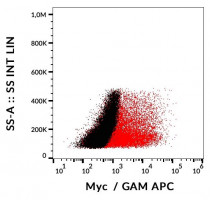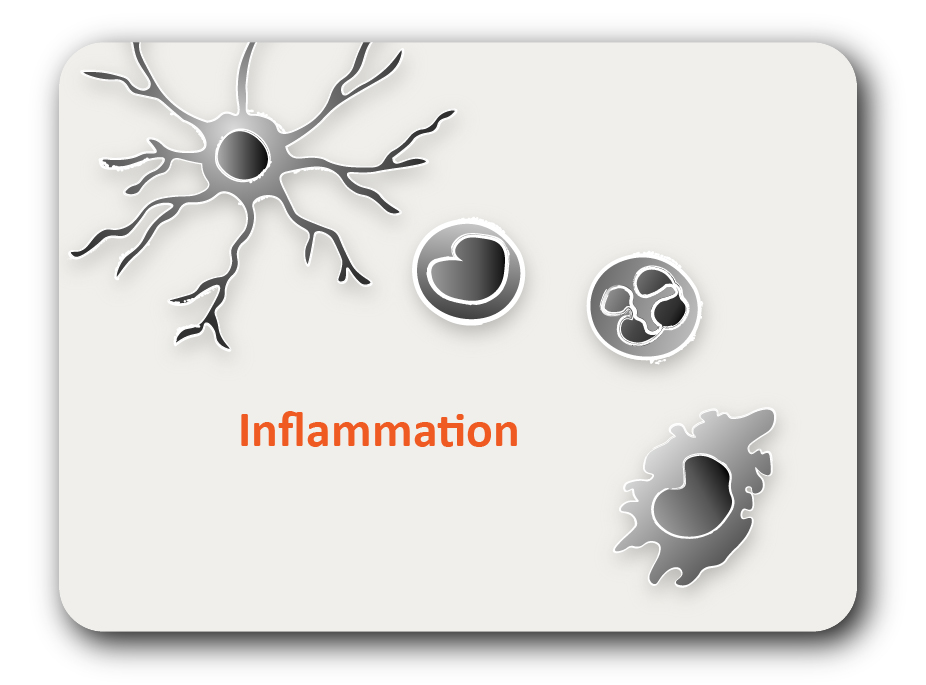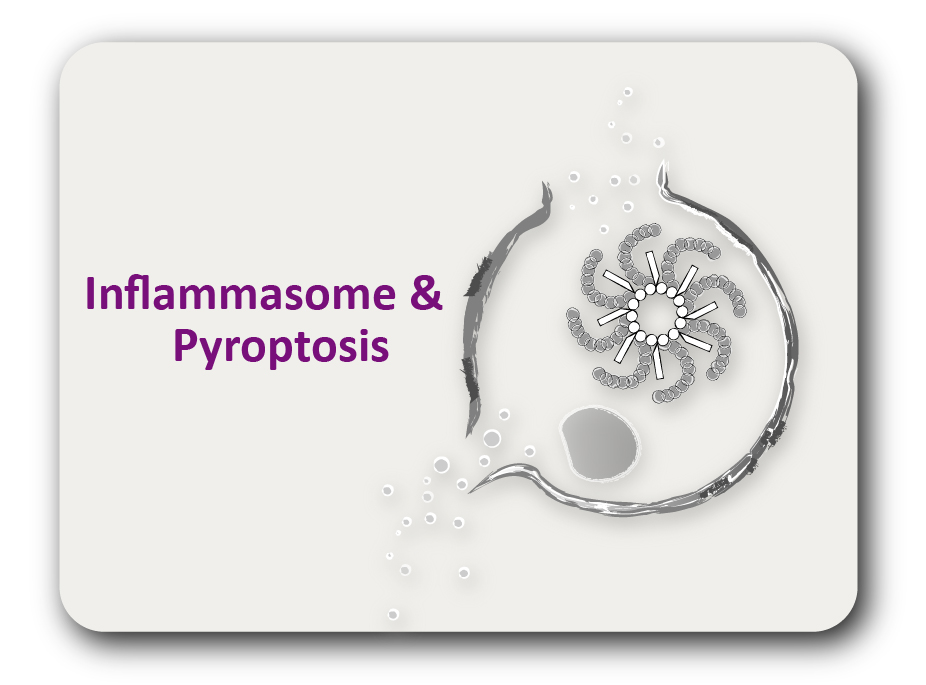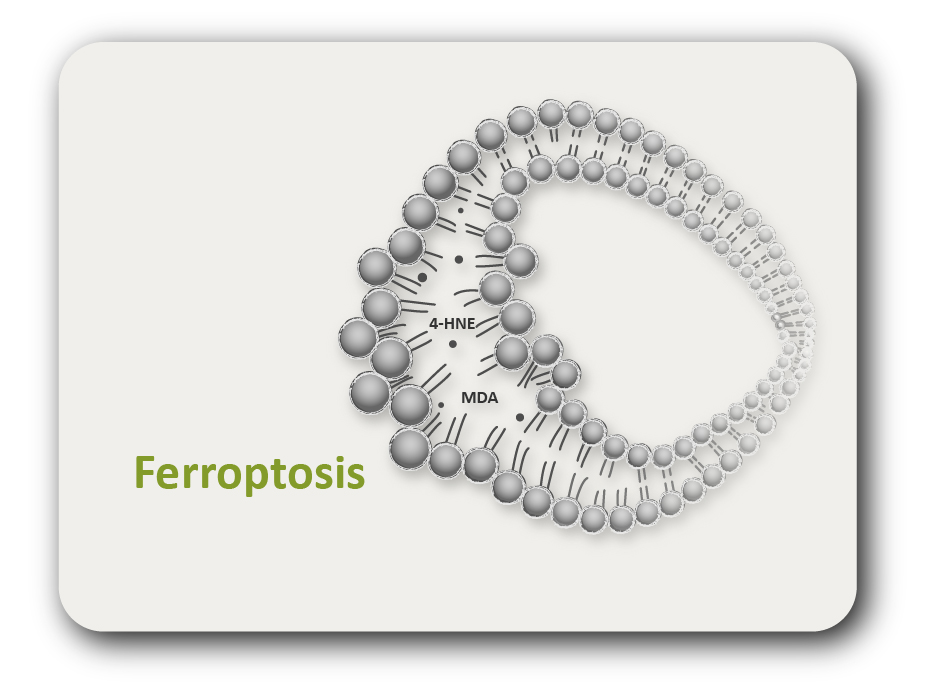ARG62962
anti-Myc tag antibody [9E10]
anti-Myc tag antibody [9E10] for CyTOF®-candidate,Flow cytometry,IHC-Formalin-fixed paraffin-embedded sections,Immunoprecipitation,Western blot and Other
Cancer antibody; Controls and Markers antibody; Developmental Biology antibody; Gene Regulation antibody; Signaling Transduction antibody
概述
| 产品描述 | Mouse Monoclonal antibody [9E10] recognizes Myc tag |
|---|---|
| 反应物种 | Other |
| 应用 | CyTOF®-candidate, FACS, IHC-P, IP, WB |
| 特异性 | The clone 9E10 may be used to detect the c-Myc tag. The c-myc gene (8q24 on human chromosome) is the cellular homologue of the v-myc gene originally isolated from an avian myelocytomatosis virus. The c-Myc protein is a transcription factor (nuclear localization). c-Myc is commonly activated in a variety of tumor cells and plays an important role in cellular proliferation, differentiation, apoptosis and cell cycle progression. The phosphorylation of c-Myc has been investigated and previous studies have suggested a functional association between phosphorylation at Thr58/Ser62 by glycogen synthase kinase 3, cyclin-dependent kinase, ERK2 and C-Jun N-terminal Kinase (JNK) in cell proliferation and cell cycle regulation. In normal cells the expression of c-Myc is tightly regulated but in human cancers c-Myc is frequently deregulated. c-Myc is also essential for tumor cell development in vasculogenesis and angiogenesis that distribute blood throughout the cells. |
| 宿主 | Mouse |
| 克隆 | Monoclonal |
| 克隆号 | 9E10 |
| 同位型 | IgG1 |
| 靶点名称 | Myc tag |
| 抗原物种 | Human |
| 抗原 | Synthetic peptide sequence (AEEQKLISEEDLL) corresponding to the C-terminal region of Human Myc |
| 偶联标记 | Un-conjugated |
| 別名 | c-Myc; MRTL; MYCC; Class E basic helix-loop-helix protein 39; Proto-oncogene c-Myc; bHLHe39; Myc proto-oncogene protein; Transcription factor p64 |
应用说明
| 应用建议 |
|
||||||||||||
|---|---|---|---|---|---|---|---|---|---|---|---|---|---|
| 应用说明 | FACS: Membrane permeabilization is required. IP: Not suitable for IP of native c-Myc protein. * The dilutions indicate recommended starting dilutions and the optimal dilutions or concentrations should be determined by the scientist. |
||||||||||||
| 阳性对照 | WB: c-Myc tagged protein IHC-P: Perfused brain sections, liver and spleen |
属性
| 形式 | Liquid |
|---|---|
| 纯化 | Purified by protein A |
| 纯度 | > 95% (by SDS-PAGE) |
| 缓冲液 | PBS (pH 7.4) and 15 mM Sodium azide |
| 抗菌剂 | 15 mM Sodium azide |
| 浓度 | 1 mg/ml |
| 存放说明 | For continuous use, store undiluted antibody at 2-8°C for up to a week. For long-term storage, aliquot and store at -20°C or below. Storage in frost free freezers is not recommended. Avoid repeated freeze/thaw cycles. Suggest spin the vial prior to opening. The antibody solution should be gently mixed before use. |
| 注意事项 | For laboratory research only, not for drug, diagnostic or other use. |
生物信息
| 基因名称 | MYC |
|---|---|
| 全名 | v-myc avian myelocytomatosis viral oncogene homolog |
| 背景介绍 | The protein encoded by this gene is a multifunctional, nuclear phosphoprotein that plays a role in cell cycle progression, apoptosis and cellular transformation. It functions as a transcription factor that regulates transcription of specific target genes. Mutations, overexpression, rearrangement and translocation of this gene have been associated with a variety of hematopoietic tumors, leukemias and lymphomas, including Burkitt lymphoma. There is evidence to show that alternative translation initiations from an upstream, in-frame non-AUG (CUG) and a downstream AUG start site result in the production of two isoforms with distinct N-termini. The synthesis of non-AUG initiated protein is suppressed in Burkitt's lymphomas, suggesting its importance in the normal function of this gene. [provided by RefSeq, Jul 2008] |
| 生物功能 | Transcription factor that binds DNA in a non-specific manner, yet also specifically recognizes the core sequence 5'-CAC[GA]TG-3'. Activates the transcription of growth-related genes. [UniProt] |
| 研究领域 | Cancer antibody; Controls and Markers antibody; Developmental Biology antibody; Gene Regulation antibody; Signaling Transduction antibody |
| 翻译后修饰 | Phosphorylated by PRKDC. Phosphorylation at Ser-329 by PIM2 leads to the stabilization of MYC (By similarity). Phosphorylation at Ser-62 by CDK2 prevents Ras-induced senescence. Phosphorylated at Ser-62 by DYRK2; this primes the protein for subsequent phosphorylation by GSK3B at Thr-58. Phosphorylation at Thr-58 and Ser-62 by GSK3 is required for ubiquitination and degradation by the proteasome. Ubiquitinated by the SCF(FBXW7) complex when phosphorylated at Thr-58 and Ser-62, leading to its degradation by the proteasome. In the nucleoplasm, ubiquitination is counteracted by USP28, which interacts with isoform 1 of FBXW7 (FBW7alpha), leading to its deubiquitination and preventing degradation. In the nucleolus, however, ubiquitination is not counteracted by USP28, due to the lack of interaction between isoform 4 of FBXW7 (FBW7gamma) and USP28, explaining the selective MYC degradation in the nucleolus. Also polyubiquitinated by the DCX(TRUSS) complex. Ubiquitinated by TRIM6 in a phosphorylation-independent manner (By similarity). |
检测图片 (1) Click the Picture to Zoom In








